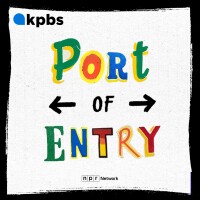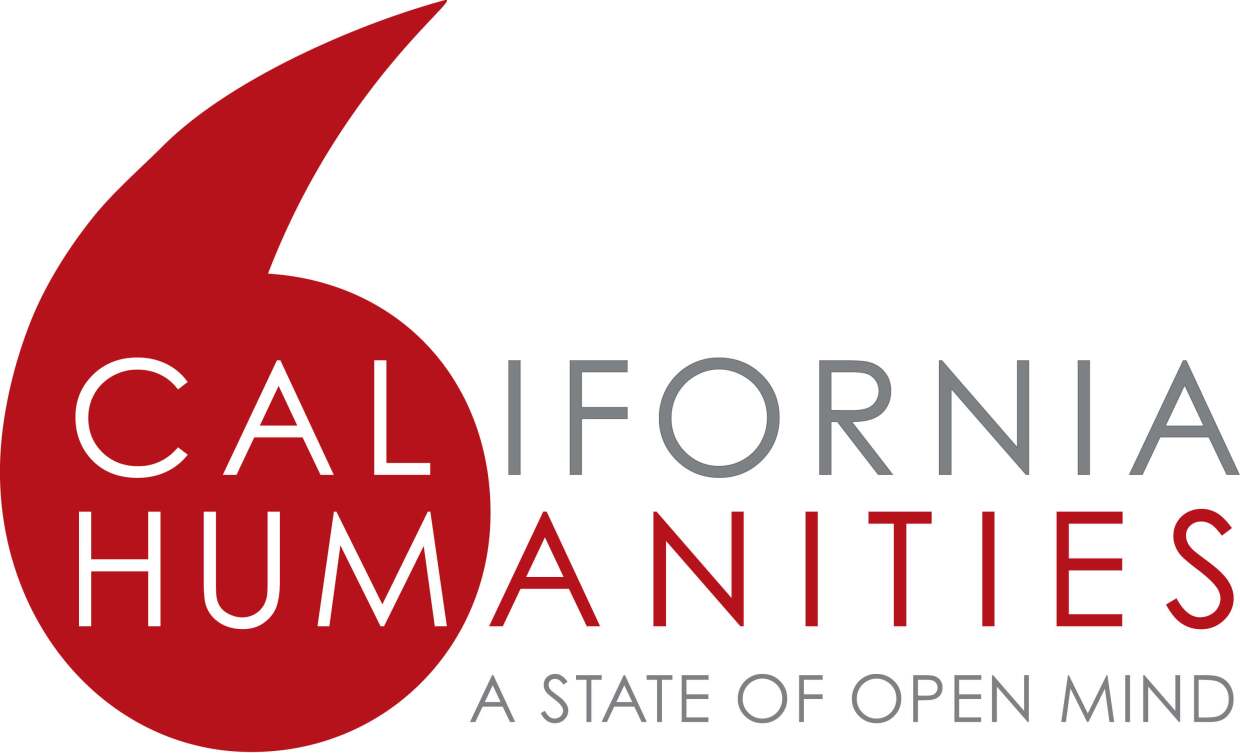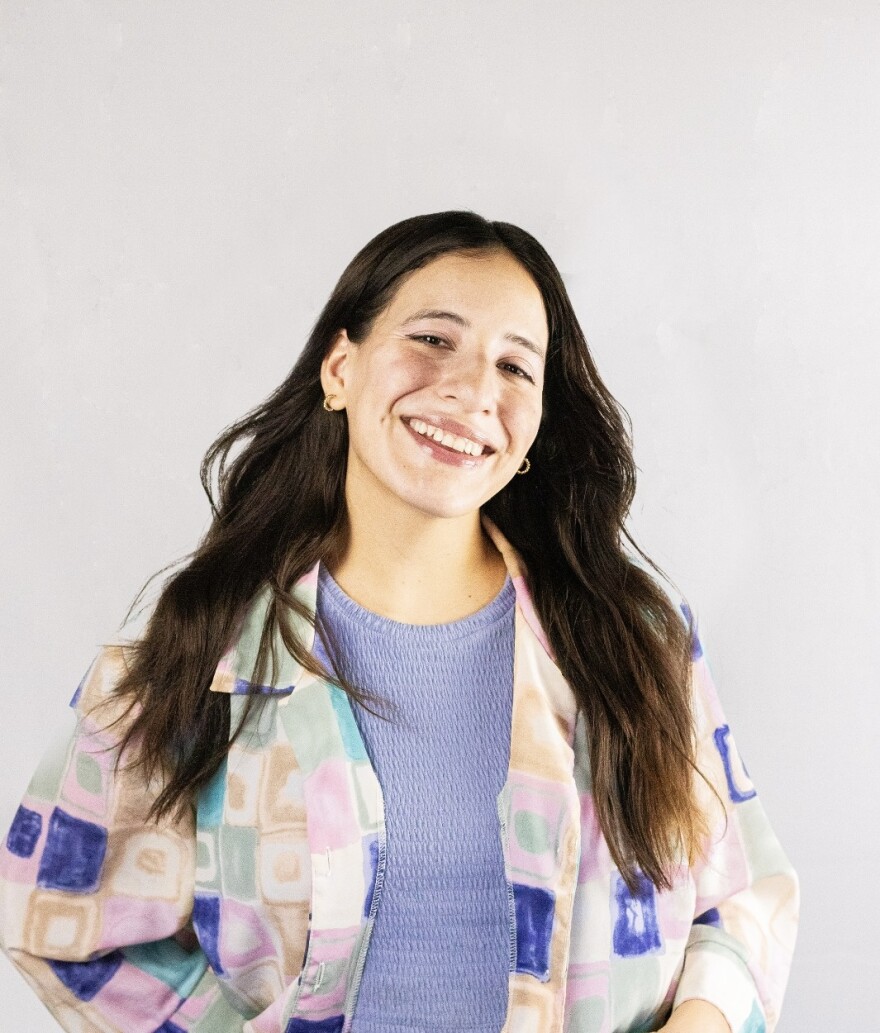Port of Entry

These are cross-border stories that connect us. Border people often inhabit this in-between place. From KPBS and California Humanities, “Port of Entry” tells personal stories from this place — stories of love, hope, struggle, and survival from border crossers, fronterizxs, and other people whose lives are shaped around the wall. Rooted in San Diego and Tijuana, we are a transborder podcast for transborder people. We live life on la linea.
Have you checked out our podcast in Spanish? If so, Take our survey.
¿Hás escuchado nuestro podcast en Español? Participa en nuestra encuesta.
Ways To Subscribe
-
¡Qué onda, friends! En el episodio de hoy, nos sentamos con Pepe Mogt y Ramon Amezcua, miembros fundadores de Nortec Collective. Reflexionan sobre haber alcanzado 25 años de carrera profesional, cómo lograron definir su sonido y el legado que han forjado en la ciudad de Tijuana. No se lo pierdan! Por cierto! Aquí les dejamos el episodio de Ramón de Port of Entry de hace algunos años! Videos del Concierto: José Ramírez / Osvaldo Valencia
-
Que onda friends! In today’s episode, we sit down with Pepe Mogt and Ramon Amezcua, founding members of Nortec Collective. They reflect on reaching a 25 years of professional career, how they got their sound, and the legacy they have forged in the city of Tijuana. Here is Ramon’s Port of Entry episode from some years back!! Stay Tuned! Concert Video Credits: Jose Ramirez / Osvaldo Valencia
-
¡Qué tal, amigos! En esta edición especial de Port of Entry, les traemos la historia de Charles Glaubitz y Giancarlo Ruiz, dos compadres de la región fronteriza Tijuana-San Diego que recientemente colaboraron en una novela gráfica titulada "The Fracture.” Adentramos en cómo este compadrazgo de décadas hizo posible la creación de este cómic. Y... lo haremos de una manera un poco diferente esta vez. ¡tambores, por favor! Les presentamos Port of Entry Shorts: cápsulas de video cortas que dan vida a nuestras historias transfronterizas de una manera nueva y fresca, ¡a través del video! Para inaugurar este nuevo formato, comenzamos con dos videos: uno protagonizado por Charles y el otro por Giancarlo. Estas cápsulas se estrenaron originalmente el otoño pasado en nuestro evento en vivo y son parte de un paquetazo de cinco episodios que incluye este episodio, además de las dos partes de nuestro evento en vivo. ¡Esperamos que disfruten estos cinco episodios! ¡Nos vemos pronto! P.S.S. También participaremos en algunos eventos públicos para hablar sobre la creación de podcasts y nuestro estilo de narrativa. Intersection 2025
-
¡Qué onda, friends! In this special bonus edition of Port of Entry, we're bringing you the story of Charles Glaubitz and Giancarlo Ruiz—two compadres from the Tijuana-San Diego border region who recently collaborated on a graphic novel titled "The Fracture." We dive into how this decades-long bromance made this comic book happen. And... we're doing it a little differently this time. Drumroll please Introducing Port of Entry Shorts: short video capsules that bring our cross-border stories to life in a fresh new way—through video! To kick off this brand-new format, we're starting with two videos: one featuring Charles, the other starring Giancarlo. These capsules originally premiered last fall at our live event, and they're part of a special five-episode bundle that includes this bonus episode, plus a two-part release (Part 1 & Part 2) capturing our live event itself. We hope you enjoy this five-episode bonanza! ¡Nos vemos pronto!
-
Que onda friends! Introducing Port of Entry shorts! Short Video capsules that tell the cross-border stories we share with you in a new way. Using video! And to kick start this new modality, we have two to share featuring our friends and guests of our live event, Charles Glaubitz and Giancarlo Ruiz. This video capsule premiered last fall during our live event and is part of a 5-episode bundle that features this capsule, a second video capsule featuring Giancarlo, a traditional podcast episode, and a two-part episode of our live event (Part 1 & Part 2) . So we hope you enjoy this 5-episode bundle bonanza! If you like this video short, share it, drop a like, and a comment! Nos vemos pronto!
-
Que onda friends! Introducing Port of Entry shorts! Short Video capsules that tell the cross-border stories we share with you in a new way. Using video! And to kick start this new modality, we have two to share featuring our friends and guests of our live event, Charles Glaubitz and Giancarlo Ruiz. This video capsule premiered last fall during our live event and is part of a 5-episode bundle that features this capsule, a second video capsule featuring Giancarlo, a traditional podcast episode titled Compadres in Art, and a two-part episode of our live event (Part 1 & Part 2) . So we hope you enjoy this 5-episode bundle bonanza! If you like this video short, share it, drop a like, and a comment! Nos vemos pronto!
-
Hi Friends, You might have heard—last year we hosted our first-ever live event, and we're excited to share it with you! Our Port of Entry Live event was part of the World Design Experience, linked to San Diego–Tijuana's 2024 World Design Capital initiative. The event joined a larger lineup of exhibitions, talks, art shows, installations, and workshops held throughout San Diego and Tijuana to showcase our area's creative talent. Today's episode contains part 1 of the unedited recording of that live event, presented in two parts. It’s part of a larger five-episode bundle, including our recent podcast episode "Charles and Giancarlo - Compadres in Art," and two short video capsules: Charles' Dream and Giancarlo's Dance. Now, sit back, relax, and enjoy. From KPBS, this is Port of Entry LIVE.
-
Hi Friends, You might have heard—last year, we hosted our first-ever live event, and we're excited to share it with you! Our Port of Entry Live event was part of the World Design Experience, linked to San Diego–Tijuana's 2024 World Design Capital initiative. The event joined a larger lineup of exhibitions, talks, art shows, installations, and workshops held throughout San Diego and Tijuana to showcase our area's creative talent. Today's episode contains part 1 of the unedited recording of that live event, presented in two parts. It’s part of a larger five-episode bundle, including our recent podcast episode "Charles and Giancarlo - Compadres in Art," and two short video capsules: Charles' Dream and Giancarlo's Dance. Now, sit back, relax, and enjoy. From KPBS, this is Port of Entry LIVE.
-
¡Qué onda, amigos! Es un momento increíble para ser fanático del fútbol en San Diego y en toda la región fronteriza. La llegada de San Diego FC, la franquicia más nueva de la Major League Soccer, ha desatado una ola de fiebre futbolística en toda la comunidad Nos unimos con Barra 18 uno de los grupos oficiales de seguidores de SDFC, para asistir un watchparty del juego y aprender de primera mano qué es lo que tiene a los fanáticos tan emocionados. También, nos sentamos con Jacob Aere de KPBS, productor de la mini-serie digital “Soccer a la Frontera” para hablar sobre la historia y la cultura del fútbol en la región y sobre cómo se armó esta serie de 5 partes. Por ultimo, nos reconectamos con un viejo amigo para escuchar sus pensamientos sobre este momento histórico. Este episodio es todo sobre fútbol, ¡asegúrate de sintonizar! Acompañenos! P.D. Deberías echarle una escuchada a nuestro episodio Gringo Xolos que armamos hace unos años. P.D.D. También participaremos en algunos eventos públicos para hablar sobre la creación de podcasts y nuestro estilo de narrativa. Tijuana Design Week - May 2, 2025 Escuela Libre de Arquitectura , Tijuana, B.C. 2 pm - 3 pm Nos vemos pronto!
-
Qué onda, friends! It's an incredible moment to be a soccer fan in San Diego and across the border region! The arrival of San Diego FC, Major League Soccer's newest franchise, has unleashed a wave of soccer fever throughout the entire community. We tagged along with Barra 18, one of the official supporter groups of SDFC, to catch an away game and learn firsthand what's got fans buzzing with excitement. Later, we sat with KPBS's Jacob Aere, producer of the digital mini-series “Soccer a la frontera” to talk about the history and culture of soccer in the region and putting this 5-part series together. Plus, we reconnect with an old friend to hear his thoughts about this historic moment. This episode is all about soccer—make sure to tune in! Nos vemos pronto! P.S. You should check out our episode Gringo Xolos that we put together a few years ago. P.S.S. We will also be taking part in a few public events to talk about podcasting and storytelling. San Diego City College Podfest on April 23, 2025 SD City College, Room AH 306 2 pm - 4 pm Tijuana Design Week on May 2, 2025 Escuela Libre de Arquitectura , Tijuana, B.C. 2 pm - 3 pm Hope to see you there!
Alan Lilienthal is a musician and the co-host of “Port of Entry,” a KPBS podcast about cross-border culture and the people who shape it. His life’s mission is to melt borders and celebrate our shared humanity through art.
Natalie Gonzalez is the co-host of ‘’Port of Entry” — a KPBS podcast. The podcast covers stories about cross-border people whose lives have been shaped by Tijuana and San Diego. Natalie is also a theater actress from Tijuana Hace Teatro. She studied at Universidad Iberoamericana in Tijuana where she graduated from Communications and Media School.

This project was made possible in part with support from California Humanities, a non-profit partner of the National Endowment for the Humanities. Visit calhum.org.












